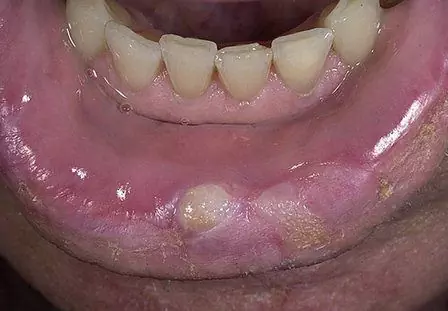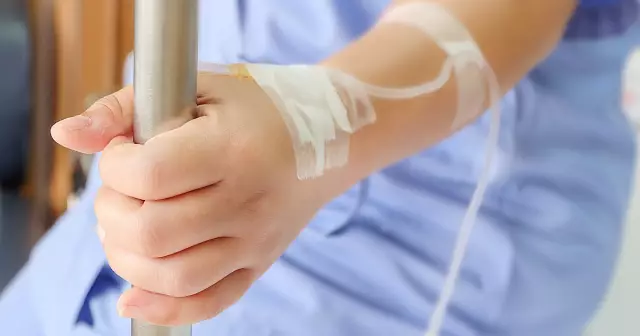- Author Rachel Wainwright wainwright@abchealthonline.com.
- Public 2023-12-15 07:39.
- Last modified 2025-11-02 20:14.
Lip cancer
Brief description of the disease

Lip cancer, like many other malignant neoplasms, is a consequence of another disease, which is usually chronic for a long time.
Lip cancer comes from the stratified squamous epithelium of the red border of the lips, and, most often, the lower lip (more than 90% of cases). Lip cancer is more common in rural people and people over 60, especially heavy smokers.
Causes of lip cancer
As mentioned above, villagers are susceptible to lip cancer, and it is no coincidence. Prolonged sun exposure is one of the causes of lip cancer. These also include mechanical trauma to the lips, exposure to high temperatures and carcinogens, and chronic inflammatory processes. However, in the first place, we can safely put as many as three causes of lip cancer: smoking, consumption of nasvay and alcohol abuse - all of them are "triggers" in the development of lip cancer, as well as cancer of the tongue and mouth.
Lip cancer symptoms
First of all, the chin lymph nodes react to the appearance of "enemy" cells, becoming inflamed and becoming mobile. They can be easily seen by feeling the lower jaw. Further, a swelling appears on the surface of the lower lip, which is slightly itchy and has a dense consistency. Even if you develop these lip cancer symptoms, chances are you will not pay attention to it and mistake it for a cold. At this time, in the center of the swelling, a sore with a ridge-like edge, which has indistinct boundaries, has already formed. At the center of this sore is a crust that is painless in itself, but can cause pain when removed. If you remove this crust, you can see a bleeding base formed by tubercles.
Symptoms of lip cancer may not be noticed at the initial stage, but later they will make themselves felt. The tumor can develop slowly, in some cases this process can take several years. Soon an infiltrate appears around it - an accumulation of cancer cells mixed with blood. You can also notice that the lymph nodes have become significantly denser, and the lip has become less mobile and seems to have grown together with the jaw and in a similar state it simply becomes difficult for a person to eat. Then a slight deformation of the lip appears, an uncontrolled outflow of saliva occurs. Gradually, the tumor tissue disintegrates, and against the background of disturbed nutrition, cachexia (depletion of the body) develops. Tumor metastases can spread to lymph nodes, which subsequently begin to turn into infiltrates. Metastases can also affect bones, thereby destroying the jaw.
Lip cancer treatment
Cancer of the lower lip lends itself to successful treatment, and there is confirmation of this: complete cure of lip cancer at the 4th degree - 55%, and at the 1st and 2nd - as much as 98%! Treatment for lip cancer depends on the extent and stage of the tumor, as well as on the patient's age and other medical conditions.
A surgical method for the treatment of lip cancer is used if the tumor has grown deep into the tissue of the floor of the mouth or into the lower jaw. A complex operation is performed in which the lower jaw or the floor of the mouth is partially / completely removed. Such an operation is performed only if the lip cancer tumor is localized, i.e. not extended to other organs.
The radiation method is often used, the essence of which is to conduct short-focus X-ray therapy or gamma therapy. I must say that this method of treating lip cancer is unsafe and can cause side effects such as hair loss, fatigue, burns on the face, dryness and flaking of the skin.
The cryogenic method or cold treatment of lip cancer is also possible, but at the first stage, when there are no metastases (or they are isolated). The good thing about this method is that it is absolutely safe for the elderly.
Chemotherapy is typically used to treat stage 4 lip cancer. As a rule, polychemotherapy is used in combination with radiation therapy to most effectively suppress the vital activity of cancer cells, as well as prevent the development of metastases (secondary pathological tumor foci).
A combination of two methods is extremely effective - gamma therapy and surgical removal of the tumor.
Prevention of lip cancer
Prevention of lip cancer is simple and consists of the following:
- Annual medical examination, which helps to detect lip cancer (and not only) in the early stages;
- Timely treatment of wounds, cracks on the lips that can provoke a tumor;
- Avoiding direct sunlight and using sunscreen;
- Compliance with the hygiene of the entire oral cavity.
Remember that lip cancer from smoking and chewing tobacco is the most common occurrence, so quit this addiction that is causing you and your loved ones suffering.
YouTube video related to the article:
The information is generalized and provided for informational purposes only. At the first sign of illness, see your doctor. Self-medication is hazardous to health!






